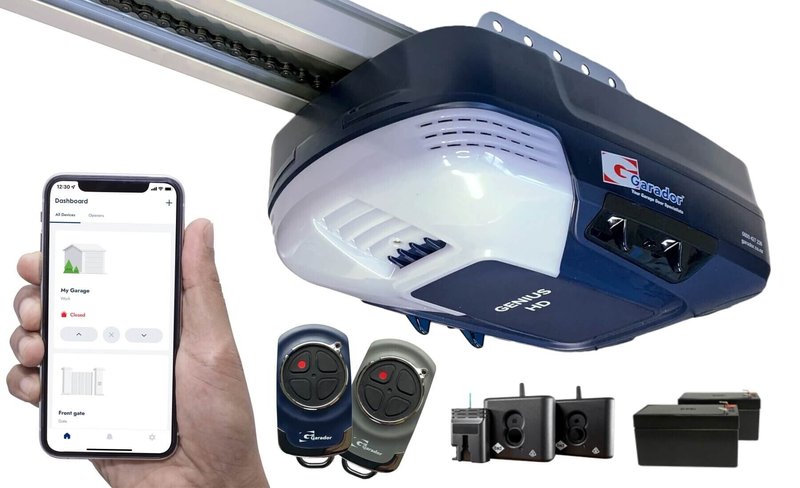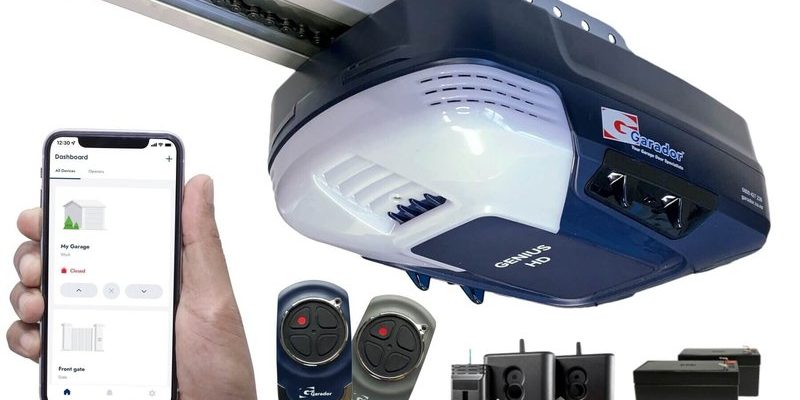
So, since we’re diving into the world of garage door openers, let’s break down what these warranties really mean. Different brands and types of openers come with varying warranty lengths and conditions. We’ll explore the nuances between them, giving you a clearer idea of what to expect when something doesn’t go as planned.
What Is A Garage Door Opener Warranty?
A garage door opener warranty is essentially the manufacturer’s promise to cover specific repairs or replacements for a designated period. It acts as a guarantee that the opener will work as intended, free from defects in material and workmanship.
Warranties can vary greatly depending on the brand, model, and the components covered. Some warranties are straightforward, while others have layers of fine print that can be daunting. Here’s the thing: knowing what your warranty includes is key to avoiding unwelcome surprises down the road.
Most warranties detail what parts are covered, how long the coverage lasts, and what steps you need to take to file a claim. Common components included in warranties are the motor, remote, and safety sensors, but you’ll want to read the fine print to ensure you won’t be left in the lurch.
Types of Garage Door Openers
There are several types of garage door openers, each with its own set of features and benefits. Understanding these options can help you choose the right one for your home, which will ultimately impact your warranty experience.
1. Chain Drive Openers: These are the most common types. They rely on a metal chain to lift the door and are known for being reliable and cost-effective. However, they’re also the loudest, which might not sit well with your neighbors.
2. Belt Drive Openers: If noise is a concern, you might want a belt drive opener. These use rubber belts instead of chains, which makes them quieter but usually a bit pricier. Their reliability is comparable to chain drives.
3. Screw Drive Openers: These openers use a threaded steel rod to open the door. They require less maintenance but can be affected by extreme temperatures.
4. Direct Drive Openers: This is a newer type, where the motor is directly mounted on the rail, making it notably quiet and durable. These often come with longer warranty periods.
Understanding these types can help you determine which categories typically offer longer warranties, ensuring you’re not only happy with your opener’s performance but also covered in case of defects.
Common Warranty Periods
Warranty periods for garage door openers can range widely. Here’s a breakdown of what you can expect:
– 1-Year Warranty: Many budget models come with just a one-year warranty. This minimal coverage might be okay if you’re looking for a short-term solution but keep in mind the risks involved.
– 3-Year Warranty: Mid-range models usually offer a three-year warranty. This is a good balance between value and reliability, providing a bit more peace of mind.
– Lifetime Warranty: High-end models often boast lifetime warranties on the motor and some components. However, be sure to check what “lifetime” means in practical terms, as it can vary by manufacturer.
Typically, the longer the warranty, the more confidence a brand has in its product. But remember, some warranties cover only certain parts—like the motor or electronics—while others extend to complete assemblies.
What to Look for in a Warranty
When evaluating garage door opener warranties, pay attention to several key factors:
1. Duration: As mentioned, the warranty length gives you an idea of the product’s expected lifespan.
2. Coverage Scope: Not all parts are covered equally. Understand which components are included and for how long. Some warranties cover only the opener, while others might extend to the remote and safety features.
3. Transferability: If you plan to move or sell your home, a transferable warranty can be a valuable asset, enhancing your property’s appeal.
4. Customer Support: A warranty is only as good as the company backing it. Research customer reviews to see how responsive and helpful the manufacturer is when issues arise.
This diligence in understanding warranties in advance can save you headaches later when the garage door won’t budge during that early morning rush.
How to Claim Warranty Work
Here’s the scoop on claiming warranty work. First, always keep your receipt and register your product, if the brand allows. Many manufacturers require registration to enable warranty claims. The steps usually include:
1. Identify the Issue: Figure out what’s wrong with the opener. Are you getting error codes on the remote or is it not responding at all?
2. Locate the Warranty Information: Review the warranty document or the company website for guidance on filing a claim.
3. Contact Customer Support: Get in touch with the manufacturer’s support team. They typically have procedures for addressing warranty claims, and you might need to provide proof of purchase.
4. Follow Instructions: Depending on the specific process, you may need to send in parts for repair or replacement. Don’t hesitate to ask for clarification if needed.
5. Document Everything: Keep records of your communications and any repairs done. This can help streamline potential future claims.
Being diligent about these steps can save time and frustration down the line.
Comparing Brands and Their Warranties
Garage door openers come from various brands, each offering its own warranty policies. Here’s a quick overview:
| Brand | Motor Warranty | Parts Warranty | Transferable | Support Quality |
|—————-|—————-|—————–|————–|—————–|
| Chamberlain | Lifetime | 1-3 Years | Yes | Excellent |
| LiftMaster | Lifetime | 1-3 Years | Yes | Very Good |
| Genie | 1-5 Years | Limited Coverage | Limited | Good |
| Craftsman | 1-5 Years | Limited Coverage | No | Fair |
These comparisons highlight how warranties can differ from brand to brand. Researching this info can help you land a reliable opener for your home.
Understanding Limitations and Exclusions
Warranty limitations and exclusions can be real deal-breakers if you’re not informed. Common exclusions include:
– Improper installation: If you’re not following the installation guidelines, you may void your warranty.
– User damage: Accidental damage caused by user error isn’t usually covered.
– Environmental conditions: Extreme weather or other external factors can sometimes invalidate warranties.
Reading the fine print is crucial. Manufacturers may also specify that regular maintenance is required to keep the warranty valid. It might sound tedious, but a little attention can save a lot of heartache later.
What Happens After the Warranty Expires?
Once your warranty runs out, it doesn’t mean your opener suddenly becomes junk. In fact, many openers can last years with proper maintenance. However, be prepared for potential costs. Here’s what to consider:
– Repairs: Often, out-of-warranty repairs can be surprisingly cost-effective. Just get a few quotes to ensure you’re not overpaying.
– Replacement: Depending on the age and efficiency of your opener, it might be smarter to upgrade rather than repair.
– DIY Troubleshooting: Many common issues can be resolved easily with a bit of research and DIY know-how. Simple fixes may not require professional help.
Before making a decision, weigh the costs of repair against the expense of investing in a new unit with an updated warranty.
Navigating the world of garage door opener warranties can feel overwhelming at first, but understanding the landscape is key. From knowing the different types of openers to comprehending what each warranty covers, each step will guide you towards making a well-informed decision.
Remember, a strong warranty can act as a safety blanket for your investment and give you peace of mind about repairs down the line. So, whether you’re opting for a quiet belt drive or a robust chain drive opener, doing your homework will pay off in spades. Happy shopping for that perfect opener!
